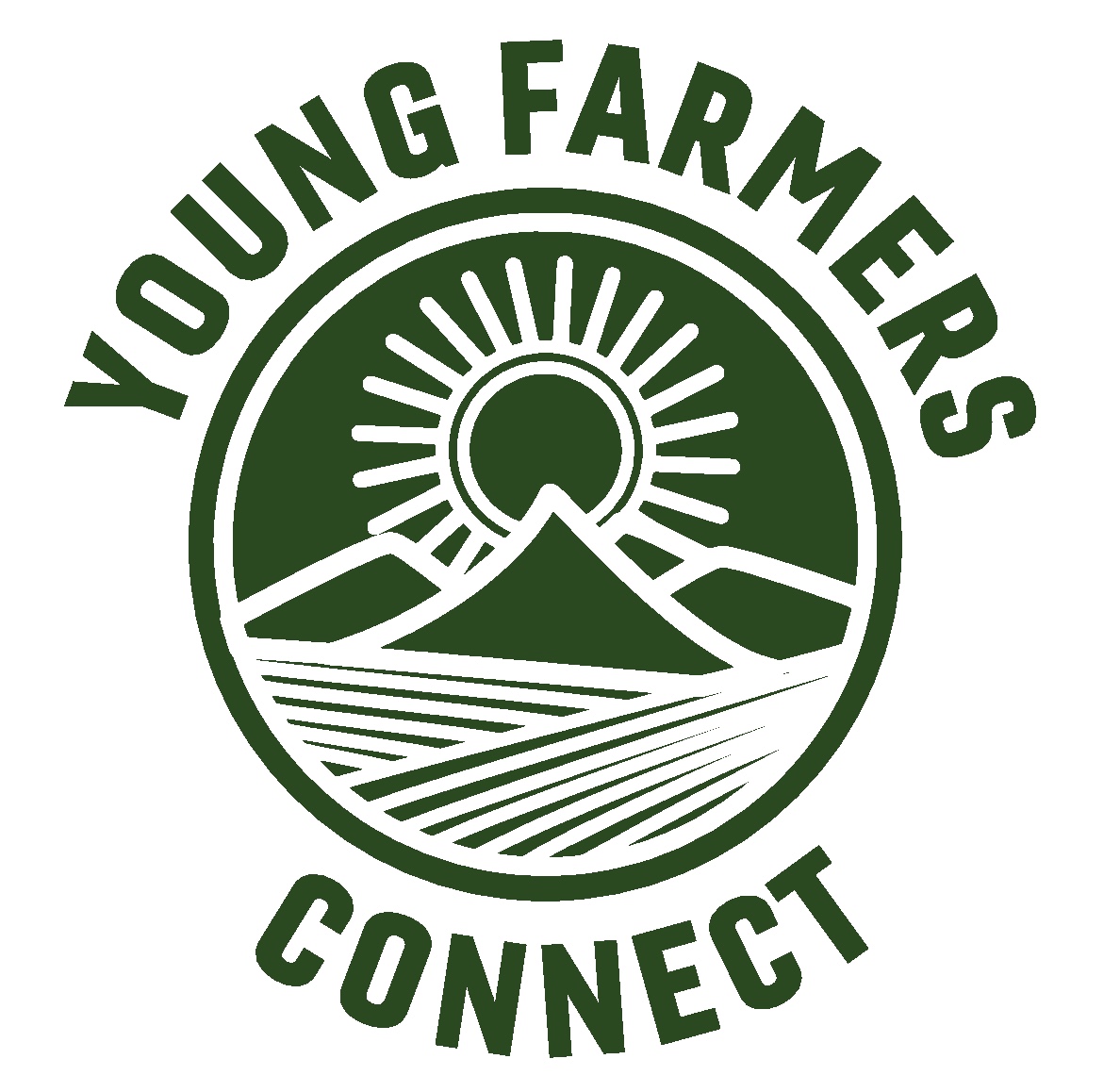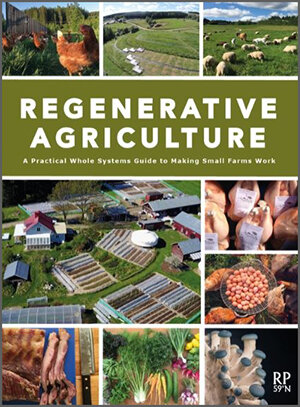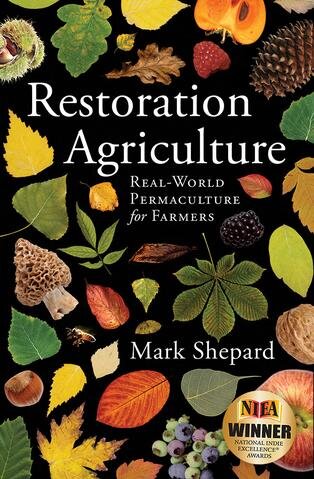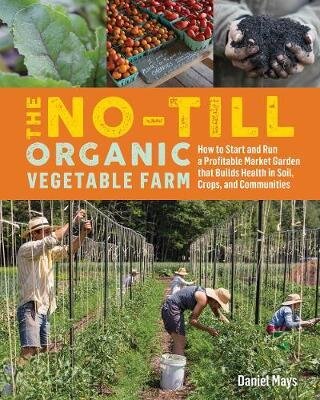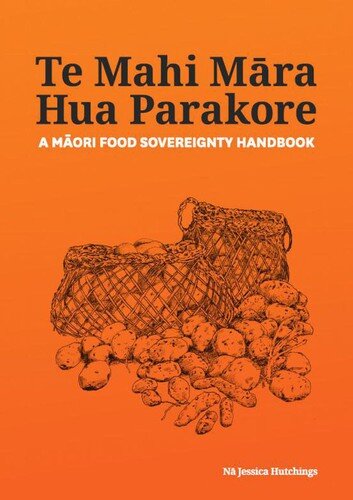The regenerative market gardeners reading
Whether you are well on your journey or just at the beginning - these books and more are the recommended choices by market gardeners and the the market gardening community.
We will endeavour to keep this list contemporary and are open to suggestions, ideas and updates.
Forever growing and learning together - lets help each other towards more SUSTAINABLE futures
The New Organic Grower - Eliot Coleman
With more than 45,000 sold since 1988, The New Organic Grower has become a modern classic. Master grower Eliot Coleman continues to present the simplest and most sustainable ways of growing top-quality organic vegetables. Coleman updates practical information on marketing the harvest, on small-scale equipment, and on farming and gardening for the long-term health of the soil.
The Market Gardener- jean-martin fontier
Jean-Martin Fortier and Maude-Helene Desroches are the founders of Les Jardins de la Grelinette, an internationally recognised micro-farm famous for its high productivity-profitability using low-tech, high-yield methods of production. A leading practitioner of biologically intensive cropping systems, Jean-Martin has more than a decade's worth of experience in mixed organic farming.
regenerative agriculture - richard perkins
Regenerative Agriculture offers a clear and pragmatic approach to designing, installing and managing profitable small farms, and is built around Richard's tireless work to restore the dignity to rural stewardship through intelligent human-scale farming. Regenerative farming restores soils and benefits local consumers and communities whilst turning a healthy profit for the diligent farmer. It offers a deep look into the ecological practical, personal and financial realms of making small farms work
The Living Soil Handbook - Jesse Frost
Principles and farm-tested practices for no-till market gardening--for healthier, more productive soil!
From the host of the popular The No-Till Market Garden Podcast--heard around the world with nearly one million downloads!
Discovering how to meet the soil's needs is the key task for every market gardener. In this comprehensive guide, Farmer Jesse Frost shares all he has learned through experience and experimentation with no-till practices on his home farm in Kentucky and from interviews and visits with highly successful market gardeners in his role as host of The No-Till Market Garden Podcast.
Restoration Agriculture - Mark Shepard
Around the globe most people get their calories from annual agriculture - plants that grow fast for one season, produce lots of seeds, then die. Every single human society that has relied on annual crops for staple foods has collapsed. Restoration Agriculture explains how we can have all of the benefits of natural, perennial ecosystems and create agricultural systems that imitate nature in form and function while still providing for our food, building, fuel and many other needs - in your own backyard, farm or ranch. This book, based on real-world practices, presents an alternative to the agriculture system of eradication and offers exciting hope for our future.
The No-Till Organic Vegetable Farm - Daniel Mays
Successful no-till farming is not only possible, but it can be environmentally, socially, and economically enriching. No-till -- a method of growing crops and providing pasture without disturbing the soil with tillage -- has become a proven and enormously important alternative to standard farming practices. In this comprehensive guide to no-till vegetable farming for aspiring and beginning farmers, author Daniel Mays -- himself the owner and manager of a no-till farm in Maine -- details the many benefits of this system, and details how to establish no-till beds, intensive crop planning, mulching, techniques and timing of occultation and solarization, selection and timing of no-till cover crops, holistic approaches to weed management, and efficient methods of harvest and post-harvest handling. The book presents innovative labor structures that replace dependence on expensive machinery, as well as streamlined planning and record-keeping tools, marketing strategies, and community engagement programs like CSA, food justice initiatives, and on-farm education. It shows farmers who are concerned about the future of their profession and the planet a cohesive system that works toward the health of the soil, the farm as a whole, the natural environment, and the people it feeds and employs.
The Lean Farm - Ben Hartman
To many people today, using the words "factory" and "farm" in the same sentence is nothing short of sacrilege. In many cases, though, the same sound business practices apply whether you are producing cars or carrots. Author Ben Hartman and other young farmers are increasingly finding that incorporating the best new ideas from business into their farming can drastically cut their wastes and increase their profits, making their farms more environmentally and economically sustainable. By explaining the lean system for identifying and eliminating waste and introducing efficiency in every aspect of the farm operation, The Lean Farm makes the case that small-scale farming can be an attractive career option for young people who are interested in growing food for their community. Working smarter, not harder, also prevents the kind of burnout that start-up farmers often encounter in the face of long, hard, backbreaking labor.
For the Love of Soil - Nicole Masters
Learn a roadmap to healthy soil and revitalised food systems to powerfully address these times of challenge. This book equips producers with knowledge, skills and insights to regenerate ecosystem health and grow farm/ranch profits. Learn how to: - Triage soil health and act to fast-track soil and plant health-Build healthy resilient soil systems-Develop a deeper understanding of microbial and mineral synergies-Read what weeds and diseases are communicating about soil and plant health-Create healthy, productive and profitable landscapes.Globally recognised soil advocate and agroecologist Nicole Masters delivers the solution to rewind the clock on this increasingly critical soil crisis in her first book, For the Love of Soil. For the Love of Soil provides land managers with an action plan to kickstart their soil resource's well-being, no matter the scale
No dig gardening - Charles Dowding
An in-depth course for experienced gardeners or those new to no dig gardening
This book is for anyone wishing to learn the no dig method from the beginning, or to consolidate what they already know: it helps readers to see the simplicity of no dig, why it works so well, and how much time they can save. The course has six modules and totals 18 lessons, each one packed with easy-to-understand theory and practical advice. The lessons are beautifully illustrated with fully explained photos from Charles's no dig gardens
The Organic No-till farming revolution - Andrew Mefferd
Learn how to use natural no-till systems to increase profitability, efficiency, carbon sequestration, and soil health on your small farm.
The Organic No-Till Farming Revolution is the comprehensive farmer-developed roadmap showing how no-till lowers barriers to starting a small farm, reduces greenhouse gas emissions, increases efficiency and profitability, and promotes soil health.
Farming without tilling has long been a goal of agriculture, yet tilling remains one of the most dominant paradigms; almost everyone does it. But tilling kills beneficial soil life, burns up organic matter, and releases carbon dioxide. If the ground could instead be prepared for planting without tilling, time and energy could be saved, soil organic matter increased, carbon sequestered, and dependence on machinery reduced.
This hands-on manual offers:
Why roller-crimper no-till methods don't work for most small farms A decision-making framework for the four no-till methods: occultation, solarization, organic mulches grown in place, and applied to beds Ideas for starting a no-till farm or transitioning a working farm A list of tools, supplies, and sources.
This is the only manual of its kind, specifically written for natural and small-scale farmers who wish to expand or explore chemical-free, regenerative farming methods.
need more ! ?
Synopsis
Te Mahi Māra Hua Parakore: A Māori Food Sovereignty Handbook. Climate change, peak oil, food security, rampant consumerism, the struggle for Māori sovereignty – these issues can seem overwhelming for those of us who are primarily focused on the day-to-day task of caring for our whānau. This book makes explicit the connections between the global and the local, between the political and the personal. Jessica Hutchings (hua parakore gardener, activist, academic and certified Te Waka Kai Ora grower) explains the political implications of the decisions that we make about growing and eating kai. She encourages us to take control over the food security of our whānau, providing practical advice on how to grow kai (food) in accordance with the kaupapa of hua parakore, inspiring us with stories of hua parakore heroes and reassuring us that becoming a hua parakore gardener is a journey that anyone can embark on.
https://jessicahutchings.org/maori-food-sovereignty-handbook/
Book Description
Some of our most cherished sustainable farming practices have roots in African wisdom. Yet, discrimination and violence against African-American farmers has led to their decline from 14 percent of all growers in 1920 to less than 2 percent today, with a corresponding loss of over 14 million acres of land. Further, Black communities suffer disproportionately from illnesses related to lack of access to fresh food and healthy natural ecosystems. Soul Fire Farm, cofounded by author, activist, and farmer Leah Penniman, is committed to ending racism and injustice in our food system. Through innovative programs such as the Black-Latinx Farmers Immersion, a sliding-scale farmshare CSA, and Youth Food Justice leadership training, Penniman is part of a global network of farmers working to increase farmland stewardship by people of color, restore Afro-indigenous farming practices, and end food apartheid.
And now, with Farming While Black, Penniman extends that work by offering the first comprehensive manual for African-heritage people ready to reclaim their rightful place of dignified agency in the food system. This one-of-a-kind guide provides readers with a concise “how-to” for all aspects of small-scale farming
https://www.farmingwhileblack.org
Advancing Biological Farming : Garry Zimmer
Gary Zimmer is recognized for improving farming by restoring soils. Arguing that an optimally productive soil contains a balance of inorganic minerals, organic materials and living organisms, he relies less on modern improvements than on "the things we’ve learned by improving fertility in a natural, sustainable way over many years." This book offers scientific support for committed organic farmers as well as conventional farmers who'd like to reduce chemical inputs and use natural processes to their advantage.
The Regenerative Growers Guide to Garden Amendments : Nigel Palmer
The Regenerative Grower's Guide to Garden Amendments, experimental gardener and author Nigel Palmer provides practical, detailed instructions that are accessible to every grower who wants to achieve a truly sustainable garden ecosystem - all while enjoying better results at a fraction of the cost of commercial fertilisers. These recipes go beyond compost by allowing you to make your own biologically diverse inoculants and mineral-rich amendments using leaf mould, weeds, eggshells, bones and other common materials available for little or no cost.
The Organic Farmers Business Handbook: Richard Wiswall
In The Organic Farmer's Business Handbook, Richard Wiswall shares advice on how to make your vegetable production more efficient, better manage your employees and finances, and turn a profit. From his twenty-seven years of experience at Cate Farm in Vermont, Wiswall knows firsthand the joys of starting and operating an organic farm--as well as the challenges of making a living from one. Farming offers fundamental satisfaction from producing food, working outdoors, being one's own boss, and working intimately with nature. But, unfortunately, many farmers avoid learning about the business end of farming; because of this, they often work harder than they need to, or quit farming altogether because of frustrating--and often avoidable--losses.
No-Till Intensive Vegetable Culture: Brian Ohara
From a veteran organic grower: a unique agricultural methodology that delivers higher yields, higher quality, and higher profitability--absolutely free of herbicides or pesticides
No-till farming has rapidly grown in popularity among vegetable growers due to its high-quality, high-yield, high-profit results. Renowned organic grower Bryan O'Hara perfected the technique during the multi-year transition of his Connecticut vegetable farm to a no-till system. His vibrantly healthy, resilient plants are testaments to the value of allowing the inherent biological functions in soil to do their work.
In No-Till Intensive Vegetable Culture, O'Hara describes the methods he has developed, which are completely free of herbicides or other pesticides and require only a few acres of land and minimal capital investment. He asserts that this flexible, ecological methodology is as important for soil fertility as it is for his economic success
The Permaculture Market Garden : Zach Loeks
The illustrated guide to profitable, vibrant and sustainable permaculture-based market gardening
Permaculture tends to be very much in the domain of home gardeners and property owners. But what if we could take it all a step further, and merge the fields of permaculture and market gardening?
In The Permaculture Market Garden , author Zach Loeks brings together his passion for sustainable permaculture food production systems and beautiful, vibrant illustrations to provide a highly visual guide to the smooth integration of permaculture into the market garden, in ways that are scalable to specific situations. Profiling crops and ecosystem-based techniques, Loeks demonstrates a profitable, sustainable and approachable model for the future of market gardening.
JADAM Organic Farming: ULTRA Powerful Pest and Disease Control Solution, Make all-Natural Pesticide, The way to Ultra-Low-Cost agriculture! Youngsang Cho
ULTRA Powerful Pest and Disease Control Solution Make all-Natural Pesticide. Farm at $100 per acre a year. Everything you need to know to: Go completely organic Boost quality and yield Save huge, huge, HUGE costs Make all-natural fertilizer, pesticide and microorganism inputs yourself. JADAM’s ultimate objective is to bring farming back to farmers. Through JADAM’s method, farming can become ultra-low-cost, completely organic, and farmers can once again become the masters of farming. Farmers will possess the knowledge, method and technology of farming. When organic farming becomes easy, effective and inexpensive, it can finally become a practical alternative. Farmers, consumers and Mother Nature will all rejoice in this splendid new world we wish to open. You will learn many useful new methods including increasing microbial diversity and population, boosting soil minerals, tackling soil compaction, reducing salt level, raising soil fertility and more. This book also shows you how to make natural pesticides that can replace chemical ones. He started organic farming and raised animals himself from 1991 in Asan, Chungnam province. He went on to establish "Jadam Organic Farming" and started to promote this farming system through books and website (www.jadam.kr). He established "Jadam Natural Pesticide Institute" in 2002 from where he continued his research while integrating knowledge from many experienced farmers which led to the completion of the system of ultra-low cost Jadam organic farming. He invented and developed many technologies for a natural pesticide which he voluntarily did not patent but rather shared through books and website. His "Natural Pesticide Workshops" teaches the essence of ultra-low-cost JADAM organic farming. Lectures, too, are disclosed on Jadam website(en.jadam.kr).
These links are being provided as a convenience and reference for informational purposes only; they do not constitute an endorsement by Young Farmers Connect nor do we have a specific endorsement for individual online book retailers.
Buy local : Support your local independent book store
